Massimo Bottura Confirmed for Weekend Food Festival in Rovinj
March 10th, 2022 - One of the world’s top chefs has been confirmed as a guest of the upcoming gastronomic festival in Istria
A press conference was held today regarding the upcoming Weekend Food Festival. As we recently reported, the unique gastronomic event will be taking place the 5th to the 8th of May in the Old Tobacco Factory in Rovinj. Organised by Tomo Ricov and Boris Kovaček together with programme director Hrvoje Petrić, the festival will host many top chefs of international renown.
The WFF crew has now confirmed that Massimo Bottura, one of the world's greatest chefs and restaurateurs, will be joining the guest list.
Bottura owns several restaurants, including the famous Osteria Francescana which currently holds 3 Michelin stars and was declared the best restaurant in the world twice, topping the World’s 50 Best list in 2016 and 2018.
Born in Modena, the Italian chef inherited his love of cooking from his grandmother, writes Jutarnji list. When designing new dishes, he draws inspiration from everything around him, from art and music to fast cars. Bottura has also written numerous books, is an advocate of food waste reduction, and has launched a non-profit organisation Food for Soul which educates and encourages the community to use food responsibly and reduce food waste.
As a chef, Bottura is known for creating new culinary trends and directly influencing the international gastronomic scene. Nowadays, in addition to managing several successful restaurant projects in Italy and abroad, he stands out as an exceptional humanitarian who tirelessly initiates new actions and helps those in need.
He remembers Croatia fondly from a trip he made in 1984, when he travelled our coast on a motorbike, was hosted by the locals and prepared freshly caught fish with them. As he himself says in the video published on WWF’s Instagram page, he is looking forward to participating and sharing his visions at the Weekend Food Festival.
Bottura thus joins the impressive guest list which also includes the likes of Ana Roš, Rasmus Munk, Dabiz Munoz, Paul Ivić and Chiara Pavan.
Alongside the top chefs, some of whom will present their unique dishes at gala dinners in the restaurants of the Maistra Collection hotels, the Weekend Food Festival will be attended by many Croatian and foreign panelists who will discuss topics such as the importance of media, the role of women in gastronomy, contemporary culinary trends, as well as Croatia-specific topics such as olive growing and winemaking.
‘Apart from meeting world-class chefs, the audience will have an opportunity to sample top-quality wines from Croatia and beyond, as well as socialise with all the relevant people in the industry. All the things we managed to accomplish with the communication industry at the Weekend Media Festival, namely networking, socialising and entertainment, is now guaranteed at the biggest gastronomic event in the region’, said Boris Kovaček, the director of the Weekend Food Festival.
Weekend Food Festival Brings World Class Chefs to Rovinj This Spring
March 2nd, 2022 - The Weekend Food Festival will host some of the most renowned names in the world of gastronomy in Rovinj, Istria
The Weekend Food Festival is back in style this year! Known as the most original and attractive festival of its kind in Croatia, both educational and hedonistic, the event will take place in the spaces of the Old Tobacco Factory in the centre of Rovinj.
The best of the best, prominent food and wine experts from the region and beyond are about to gather in Rovinj from May 5th to May 8th, 2022.
Renowned names from Croatia and the world will share their knowledge, experiences, passion and enthusiasm with fellow professionals, caterers, winemakers, olive growers, foodies and food lovers eager for new discoveries and knowledge.
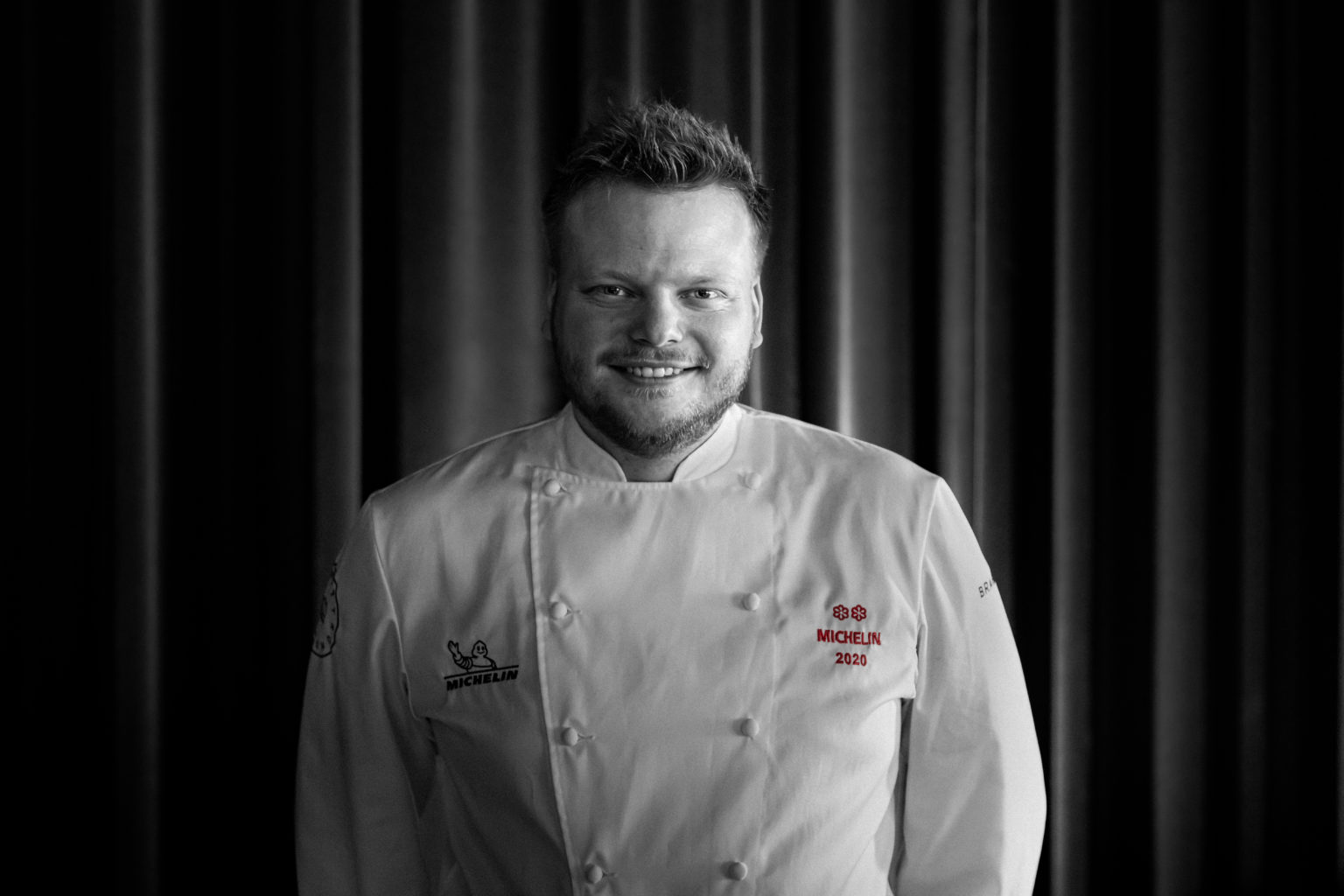 Rasmus Munk / Photo by Jon Angelo / Press
Rasmus Munk / Photo by Jon Angelo / Press
Numerous panels, masterclasses and accompanying events will provide opportunities not only for personal and professional development but also for the exchange of ideas and the opening of new perspectives and business opportunities.
Gala dinners, excellent wines, food and music guarantee that the Weekend Food Festival will be a place of good vibes and inspiring positive experiences.
Rovinj will host a number of top culinary stars from around the world, including chef Rasmus Munk from the Danish Alchemist, a restaurant with 2 Michelin stars that was named the best restaurant in Europe in 2021 by OAD; Sergey and Ivan Berezutskiy from Moscow’s Twins Garden with 2 Michelin stars; and Ana Roš, the 2017 best chef in the world whose restaurant Hiša Franko in Kobarid, Slovenia, also boasts 2 Michelin stars.
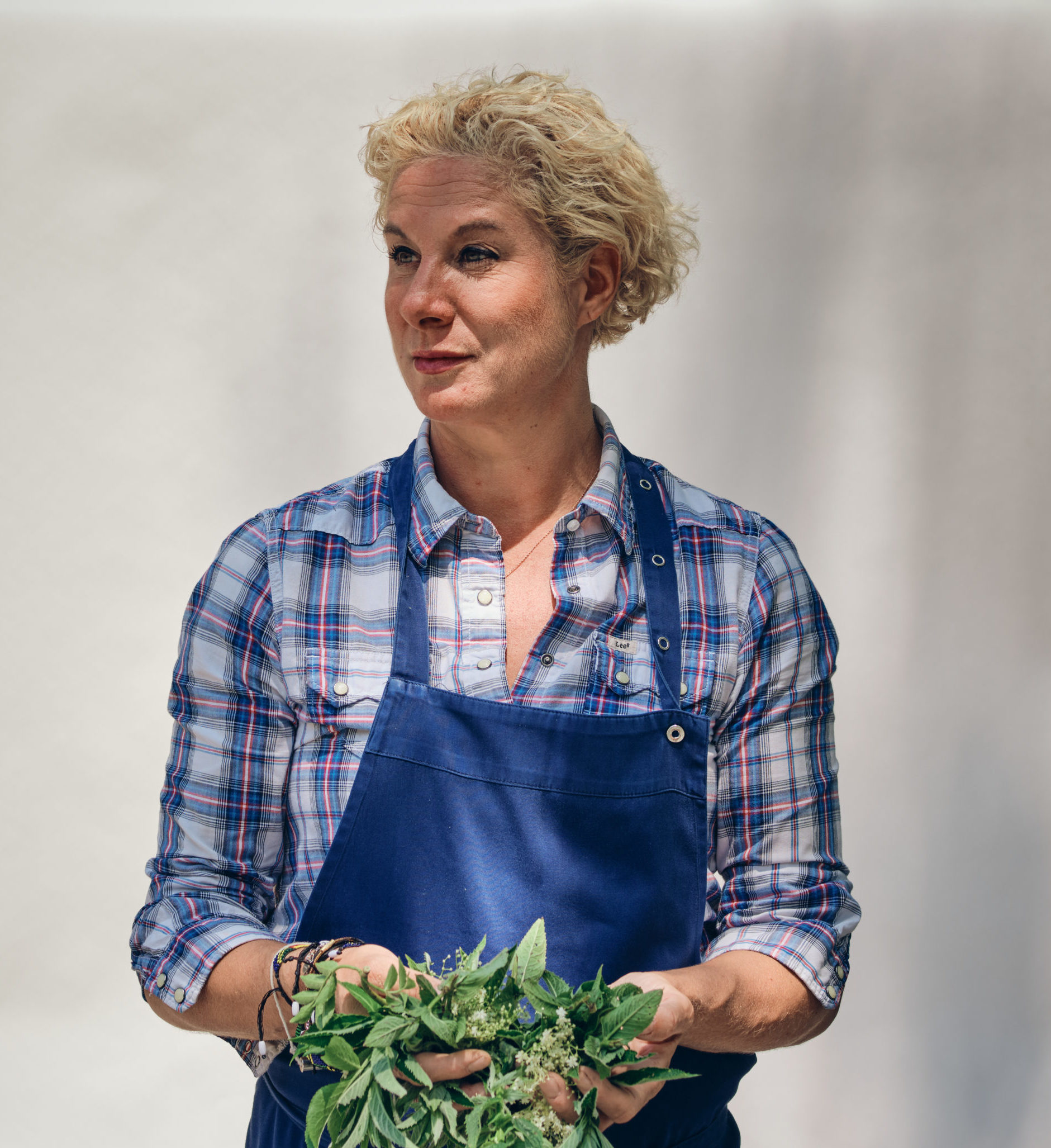 Ana Roš / Photo by Suzan Gabrijel / Press
Ana Roš / Photo by Suzan Gabrijel / Press
More festival guests will be revealed soon. In addition, the festival will also host top pastry chefs and established hotel and restaurant managers from around the world, and all festival events will be attended by the crème de la crème of culinary and lifestyle journalism from around the world.
The Weekend Food Festival is a unique opportunity for all foodies to taste the world’s best cuisines as well as sample excellent Croatian products and wines in one place.
Early bird tickets for the Weekend Food Festival are already on sale, available at weekendfoodfestival.com.
Follow the latest news about this major culinary event on Facebook and Instagram.
Unique Truffle Museum Opened in Istria by the Karlić Family
March 1st, 2022 - The museum was established in an old Istrian house that was once home to one of the pioneers of truffle hunting
A truffle museum was opened in Istria, in the village of Paladini near Buzet town. Dedicated to one of the oldest and most precious ingredients in gastronomy, the museum was opened by the Karlić family, writes Glas Istre/Doria Mohorović. The family has many years of experience in truffle hunting and are one of the most renowned manufacturers of truffle products in Croatia and beyond.
For a good part of the local population, truffle hunting is both a business activity and a way of life. The nearby Motovun forest is the biggest truffle habitat in Istria, rich in this valuable item of specific taste and smell that only grows underground. This is why Buzet was declared the City of Truffles in 1999, and their truffle story is now crowned with the newly opened attraction.
Three years ago, Ivan Karlić started to bring his vision to life with a lot of enthusiasm and a great deal of patience. Aided by the locals, he started to collect information, stories, photographs, and old tools used by truffle hunters of the past.
‘From an early age, I spent a lot of time with my late grandpa Ivan, we’d always been very close. As I often tagged along when he went truffle hunting or purchasing truffles from other local hunters, I got to hear many interesting stories. After my grandpa passed, along with a number of truffle hunting pioneers, I had a wish to share all these old stories to prevent them from falling into oblivion and to keep them alive for new generations’, said Ivan Karlić.
He first entered the world of truffles when he was two years old, when he accompanied his parents as they went truffle hunting in the woods. He calls it the best job in the world. ‘You’re walking around in nature and it’s as if you’re on a treasure hunt!’, says Karlić.
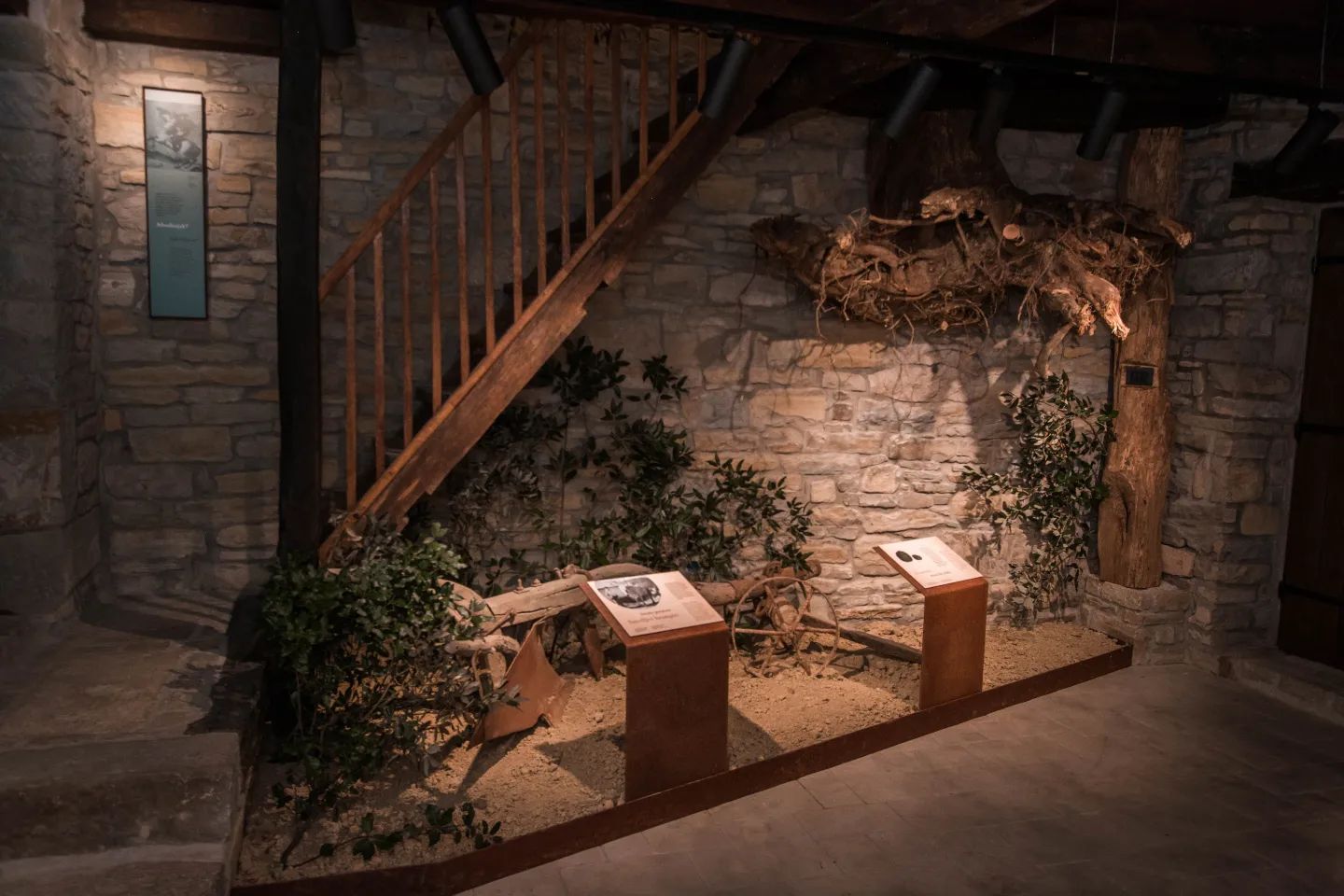 Karlić Tartufi Facebook
Karlić Tartufi Facebook
The museum was established in an old Istrian house that was once home to one of the pioneers of truffle hunting; the Karlić family bought the place and had it refurbished to house the new museum.
The truffle-themed collection is displayed on two floors. The family-business story of the Karlićs is presented on the first floor, along with the history of truffle hunting in Croatia and the world. Many interesting facts about truffles are sprinkled throughout the exhibit; for example, did you know that the extremely expensive truffles we know and love once used to be called ‘stinky potatoes’? Istrian peasants first found truffles by chance and not knowing what they were, kept discarding them until they learned of their value.
The second floor of the museum offers an interactive experience that draws the visitor into the interesting world of truffles through auditory, visual and olfactory stimuli. Along with the sounds of the Motovun forest echoing through the room, there are also videos of interviews with old truffle hunters, full of anecdotes.
On the central table, displayed are the six most common truffles that can be found in Istria. The most intense, Karlić explains, is the white spring truffle whose scent is reminiscent of chocolate - and visitors get to breathe in the rich aroma as well.
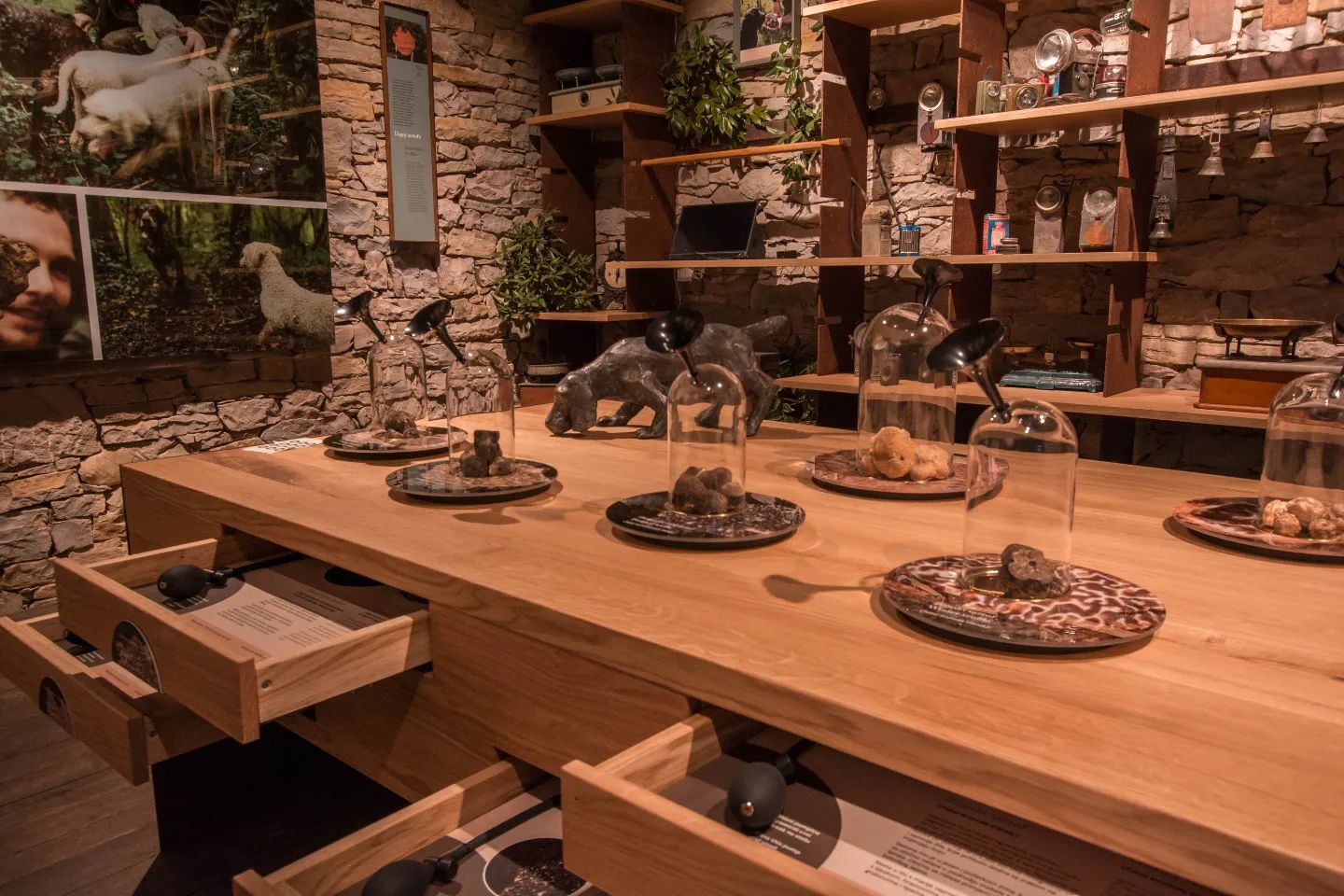 Karlić Tartufi Facebook
Karlić Tartufi Facebook
Visitors to the museum have the rare opportunity to see the largest truffle in the world, weighing 1.31 kilograms, which is entered in the Guinness Book of Records. It was found by Giancarlo Zigante, the father of truffle hunting in Istria, who gave the museum a casting of the largest white truffle for their collection.
Even though it just opened, the museum has already drawn a lot of attention. It’s not unexpected, said Karlić, considering there are only five or six museums of this kind in the whole world. He also points out the museum isn’t solely dedicated to truffles, but to truffle hunting as a business activity and a tradition cherished in all of Istria.
The truffle museum can be visited free of charge until May 1st, 2022. Located at the address Paladini 14, it will remain open throughout the year, from 9 AM to 4 PM on workdays.
Rijeka Gastronomic Ports: New Brand to Create a Unique Gourmet Story
February 3, 2022 - The new gastronomic brand aims to bring together local caterers and create a unique gourmet story rooted in Rijeka’s port-city image
The Rijeka Tourist Board and the company Abisal/Gastronaut Club have announced a new project that’s sure to pique the interest of all gourmet enthusiasts.
Rijeka Gastronomic Ports is a project that aims to bring together local catering facilities and create a unique story with immense marketing potential: a gastronomic brand that goes hand in hand with Rijeka’s port city image. The project would also offer support to caterers and improve the overall quality and brand recognition of Rijeka’s gastronomic offer.
The word port/harbour has positive connotations in itself and invokes a sense of safety: just think of the expression ‘a safe harbour’. A port is where we seek refuge from bad weather; it's a place that promises nourishment and comfort, a place we leave feeling refreshed, feeling rested.
Such feelings invoked by ports can easily be applied to other aspects of life in Rijeka; many catering facilities in the city already resemble little proverbial ports. If we think of restaurants in this way, as a caterer, what kind of port would you like your restaurant to be? Or, as a guest, what would be your gastronomic port of choice?
Perhaps a sentimental one - a family port, a romantic port? On the other hand, some might prefer to think of ports as places to conduct business and would thus want for this to be reflected in their establishment.
The possibilities are endless; as a start, nine categories have been established in the initial phase of the project. Caterers are welcome to submit additional themes for consideration, as the project owners are willing to expand the list with categories they deem to have marketing potential, i.e. they reflect specific features or services that could potentially be interesting to citizens of Rijeka and their guests.
Here’s the initial list of categories, together with a few prerequisites that catering facilities need to meet if they’re looking to participate:
Business port - restaurants in this category should have the best available Wi-Fi, widely spaced tables, a separate area for meetings, several modes of payment available, and ideally reserved parking for guests if the establishment is located outside the city centre
Romantic port - restaurants that have an appropriate decor and ambiance, and feature dishes made of ingredients known for properties related to romance - chocolate, truffles, oysters…
Family port - restaurants need to be equipped with a children’s play area and a changing station for babies, offer children’s menus and provide games or colouring books to keep kids occupied at the table
Port for wine connoisseurs - the restaurant’s wine list must contain a minimum of 30 wines, grouped by variety and including detailed descriptions; staff should be trained in wine pairing, serving and decanting
Beer port - the restaurant’s beer list must contain a minimum of 20 beers; staff should be trained in beer and food pairing
Port of local produce - restaurants should be sourcing a minimum of 70% of ingredients from local producers or grow their own produce, and provide documentation to support the claim
Vegan port - the menu must feature at least 7 vegan-friendly dishes based on legumes, whole grains, beans, nuts, fruit, vegetables, and seeds (not containing dairy, eggs, honey, gelatin, etc.)
Fishing port - caterers that either run a fishing business or source their fish directly from local fishermen
Ports of individuality - a somewhat broad category to accommodate all caterers who bring something specific or unique to the table that is not defined by any of the other categories. This includes restaurants specialising in international cuisines, provided they offer at least 7 dishes authentic to the cuisine in question, have the menu translated into the language of the country of origin, and at least one person on the staff who speaks the said language.
Caterers can apply before February 15, 2022 by filling in this form (maximum of three categories). Those caterers who have yet to ensure their services match the prerequisites of a certain port category can request a deadline extension of three weeks, provided they send the request before February 15, 2022.
The Rijeka Gastronomic Ports project was devised by Karin Mimica, a native of Rijeka and the author of the two longest-lasting quality brands in Croatian hospitality - Restaurant Croatica and Gastronaut. She has also organised several dozen conferences and projects related to positioning and branding of gastronomy in tourism.
The project is co-financed by Rijeka Tourist Board, who plan to organise a number of educational workshops for caterers in collaboration with the Gastronaut club.
Chef Vjeko Bašić Masterclass: Seasonal Ingredients featuring Wild Leeks and Culinary Tourism in Croatia
JUNE 19, 2021 - Vice-president of JRE Croatia and restaurateur Vjeko Bašić held a masterclass in Split, using wild leeks which grow abundantly in his hometown, Murter Island, to promote the diverse flora of Croatia and its importance in the country's gastronomic industry.
JRE Croatia is a part of the Jeunes Restaurateurs which is an international association of young outstanding restaurateurs and chefs across 15 countries all over the world. JRE chefs share remarkable culinary talent, a strong passion for gastronomy and sustainability, and the commitment to keep the authenticity of their own local produce, dishes, and tradition alive. The sophisticated and relaxing ambience of JRE restaurants and the delectable selection of gourmet food and top local and international wines never fail to provide their guests a memorable dining experience!
To promote the culture and diverse flora of Croatia, Chef Vjeko Bašić together with JRE Croatia conducted a masterclass in Split, Croatia featuring seasonal, rare, and native plants in Croatia. The masterclass was done in a fully-equipped and high-technology kitchen of Miele Experience Centar Split, with the intent to highlight "paski/pilci" or young garlic sprouts that grow abundantly and is used mainly in the islands of Pag and Kvarner. However, since Chef Vjeko Bašić hails from island Murter, he opted for an ingredient much closer to home - wild leeks. His class was attended by 4 outstanding young culinary students from Aspira and one intern journalist from Total Croatia News.
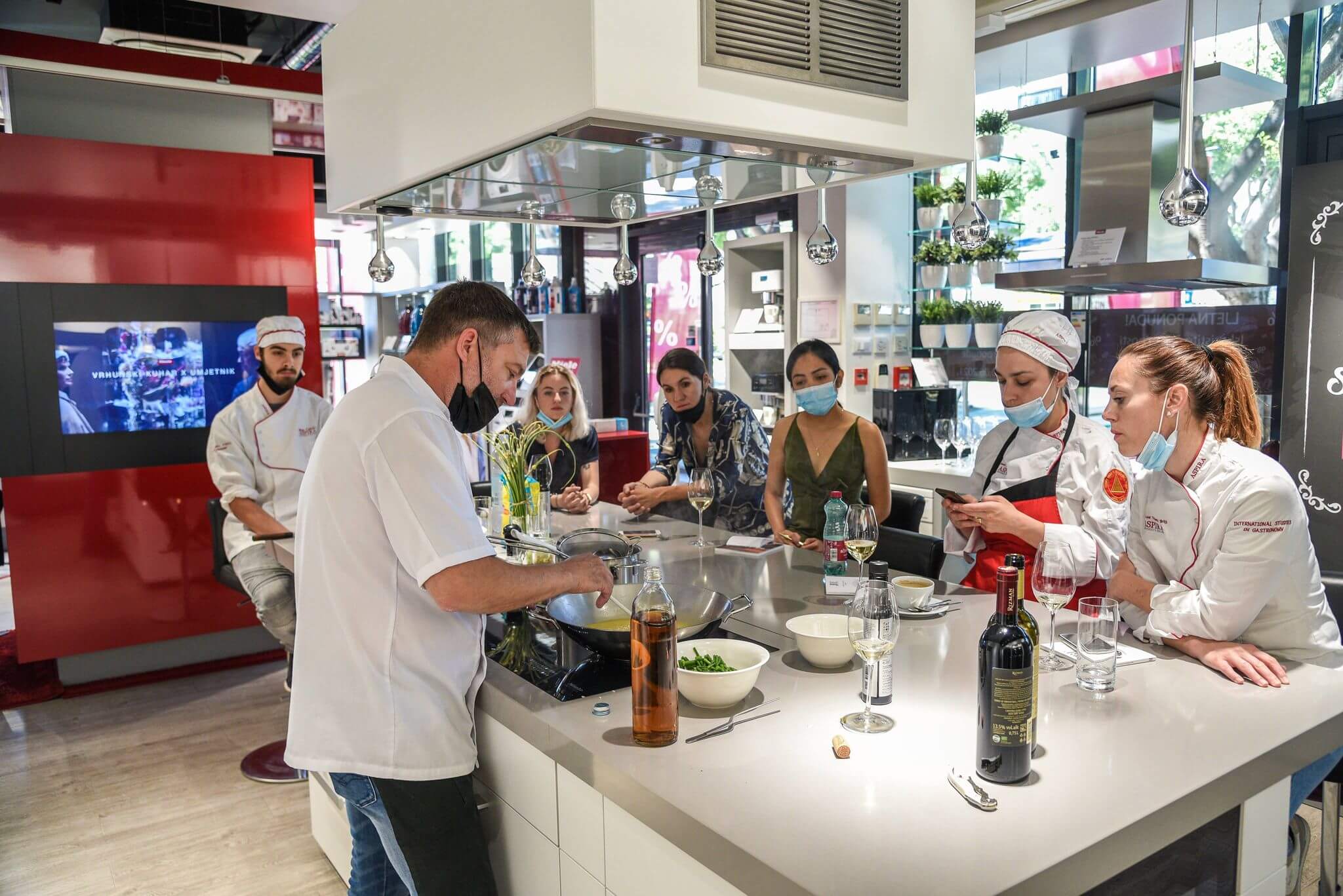
Masterclass in Miele Experience Centar Split by Chef Vjeko Bašić | Photo credit: JRE Croatia
Chef Vjeko Bašić is the owner of Konoba Boba, a fish restaurant located on the beautiful Murter Island in the Dalmatian region of Croatia. Konoba Boba is one of the 12 members and 4 honorary members of Croatian restaurateurs who have received membership in JRE Croatia. The name of the restaurant, Boba, is a family nickname that gives homage to the family's rich stories and origin. The restaurant is deeply connected to the island and therefore, highlights the usage of fresh local produce from the sea and the land of Murter itself. To respect the natural rhythm of nature and its suppliers, Konoba Boba uses seasonal ingredients and creatively incorporates locally and freshly harvested produce from their region into their menu.
The chef chose to prepare wild leek risotto for the masterclass. "On my island, my father used to pick and cook wild leeks that grow outside our house.", he fondly recalled his childhood in Murter. Prior to the class, Vjeko prepared chicken stock made with chicken, celery, leeks, onions, and carrots to be used for this special risotto. "For a good risotto, you need to have a good onion and olive oil.", he emphasized. He made a unique pesto sauce for the risotto using "paski" (young garlic sprouts), pine nuts, and olive oil and he also offered his own pickled paski for the participants to taste.
According to Vjeko, paski, wild leeks and wild asparagus grow in the same season which is from spring to early summer. It can also be prepared in a similar style as wild asparagus salad which is to blanch the vegetables, mix with some salt, pepper, and boiled eggs and add a splash of olive oil and balsamic vinegar. In cooking wild leeks and paski, only the upper part is used and the lower part is discarded for its hard texture.
As Chef Vjeko prepares his dish, Irina of JRE Croatia, offered the participants two refined selections of wine - Pošip and Plavac Mali - both from Rizman winery. "A good wine is an important part of the food experience.", Irina says as she pours each of the participants a glass of aperitif.
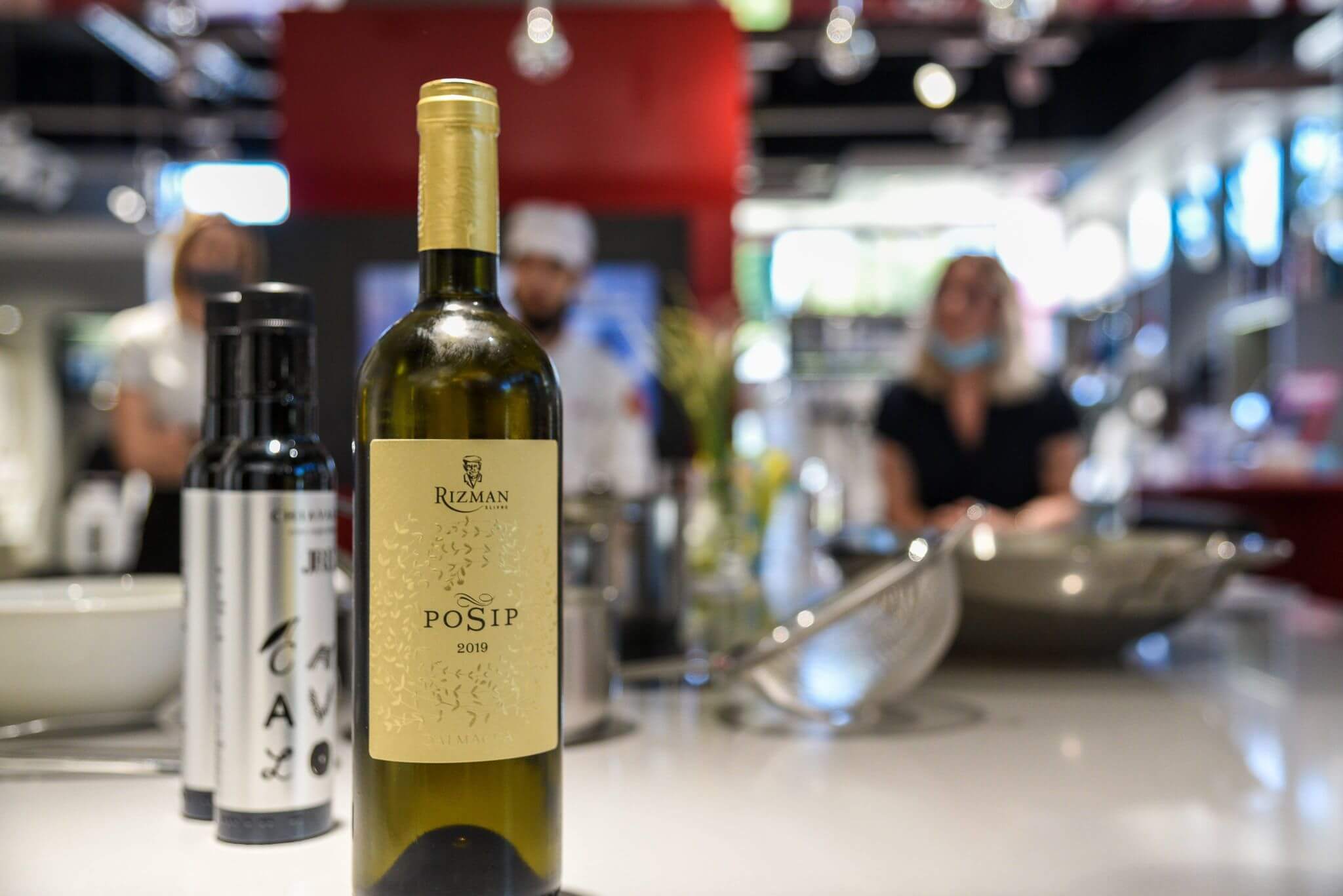
Photo credit: JRE Croatia
Rizman Winery, owned by the Stimač family, is situated in the youngest wine-growing area in Croatia which is called Komarna, in the Dubrovnik-Neretva County. The vineyards are located on a hilly area 250 meters above sea level and are close to the proximity of the sea and the famous valley of the Neretva river which provides good microclimatic conditions for wine cultivation. The wine-growing area features different soil compositions mostly of limestone and a tiny amount of organic matter, with 30% slope inclination and 2,600 hours of sunlight per year. Over 90% of vines in Rizman Winery belong to the indigenous varieties of Plavac Mali and Pošip and the rare grape variety of Tribidrag. The winery is a long-standing family tradition and the name Rizman is given to honour its founder - the grandfather and great grandfather of the Stimač family.
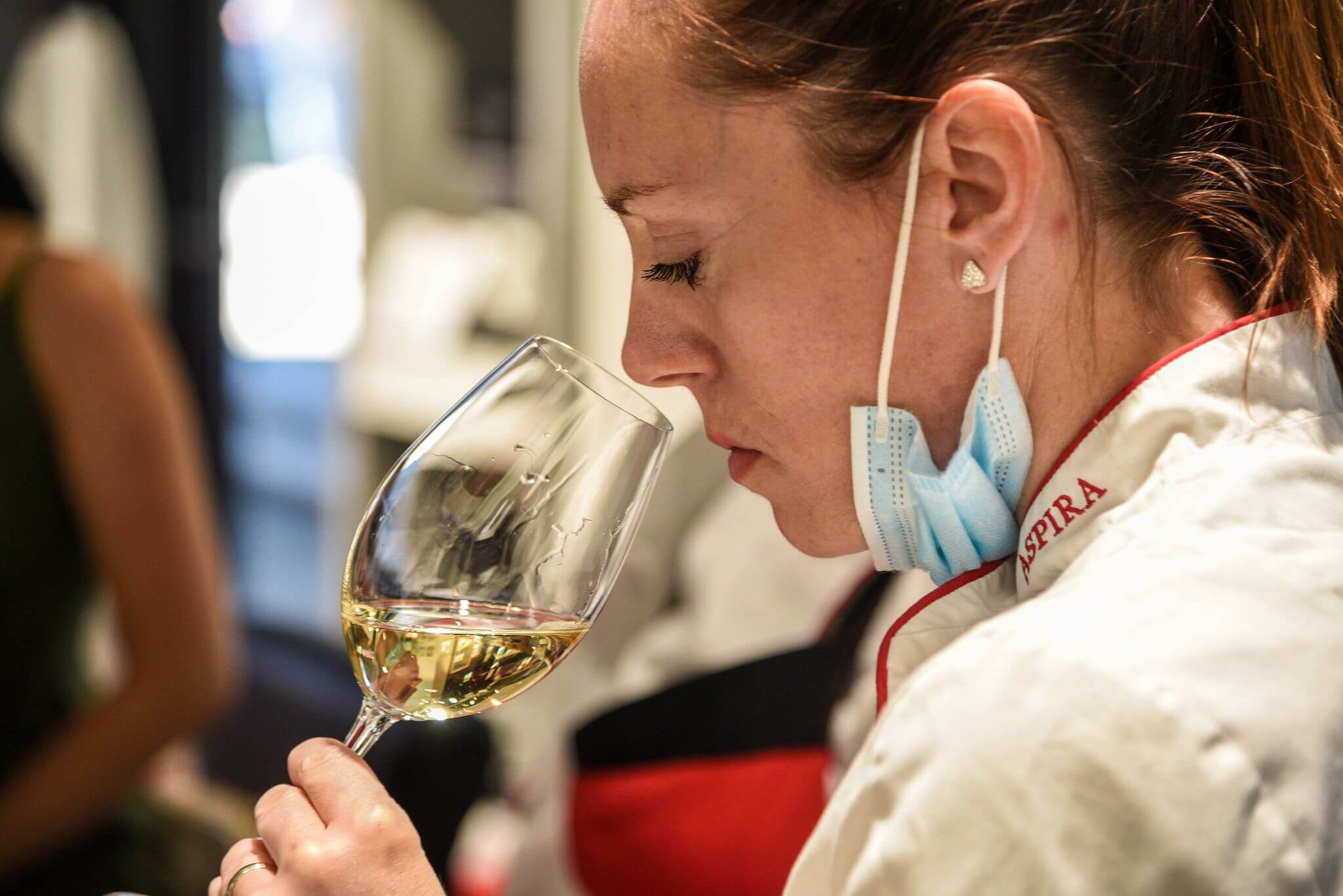
A culinary student of Aspira College savour the crisp and sweet aroma of RIzman's Pošip served in a special Malvasia Istriana Glass | Photo credit: JRE Croatia
The drinks were served in Malvasia Istriana glasses which were created by Riedel, a major manufacturer of wine accessories, dedicated specifically for Croatia's Malvasia Istriana (malvazia istarska). Malvasia is a type of wine grape with many varieties which includes Malvasia Istriana. It was a project initiated by Winemakers and Winegrowers of Istria - Vinistra Association to promote Istrian wineries and Croatian wine to the world. Nowadays, Malvasia Istriana glasses are called Superleggero Loire, because apart from pairing perfectly with Istrian Malvasia, it also pairs well with Sauvignon Blanc.
Chiavalon JRE olive oil was also used in the risotto. "Olive oil is very important to Mediterranean gastronomy", said Irina. Because of its importance, JRE wanted to have good olive oil to use in their restaurants so they partnered with Chiavalon to produce a perfectly balanced olive oil for culinary use because a strong olive oil can overpower a dish and a neutral-tasting olive oil will not give authentic Meditteranean touch to the dish. Therefore, after harvest every year, JRE Croatia and its restaurateurs get together to conduct a blind taste-test sampling to choose the oil to be used by JRE. It is a Chiavalon and JRE co-branded product of olive oil which is only found in JRE restaurants. Irina shared a tip to everyone: "For olive oil lovers, Rizman olive oil is also of top quality."
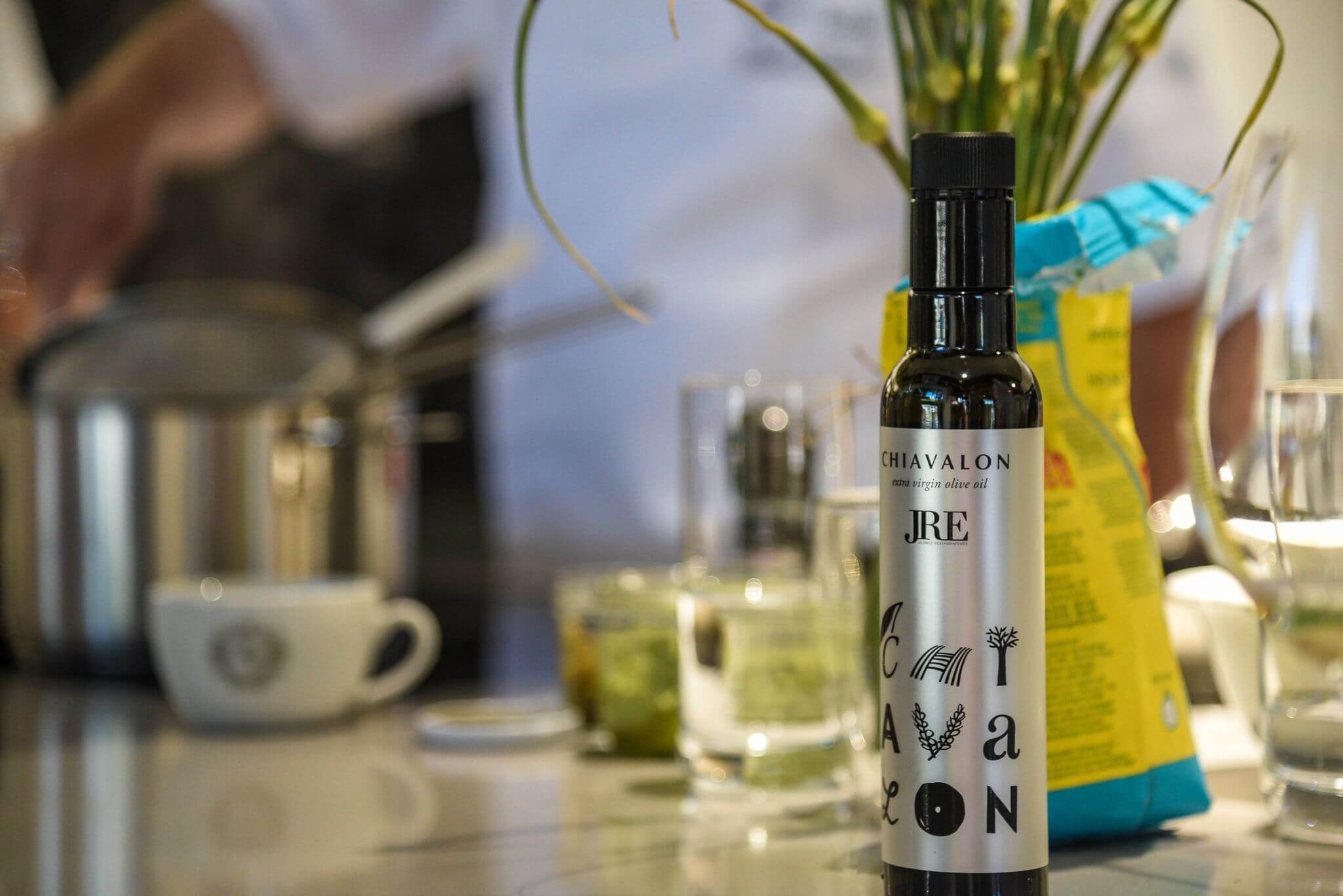
Chiavalon JRE olive oil | Photo credit: JRE Croatia
As always, every chef has a different method of cooking to bring out the best from their ingredients. "So when I cook risotto, I saute the onion in a pan, toast the rice in another skillet, and then I mix the onion with the rice after that", says Vjeko. "Why do you that?", asked one of the participants. "Because if I put the rice in the same skillet, the onion will burn.", the chef answered and then humourously added, "But you need to use a lot of pans - and now is the worst time because I don't have a sous chef with me." In this dish, carnaroli rice was used because it is ideal for risotto. He also added the pesto sauce he made from paski or young garlic sprouts in the dish. "It is also important at the end risotto to add a bit of fat - it can be butter or it can be olive oil. This time, I combined both butter and olive oil", he noted. To add acidity to the risotto, Chef Vjeko prefers to use a little bit of vinegar than the usual lemon.
After the risotto was ready, Chef Vjeko plated it beautifully and topped it off with crispy pancetta, some ricotta cheese, and homemade pickled paski. The crunchiness of the wild leek and the pancetta added a beautiful texture to the dish and the light tangy flavour from the pickled paski gave the dish a perfect balance of acidity.
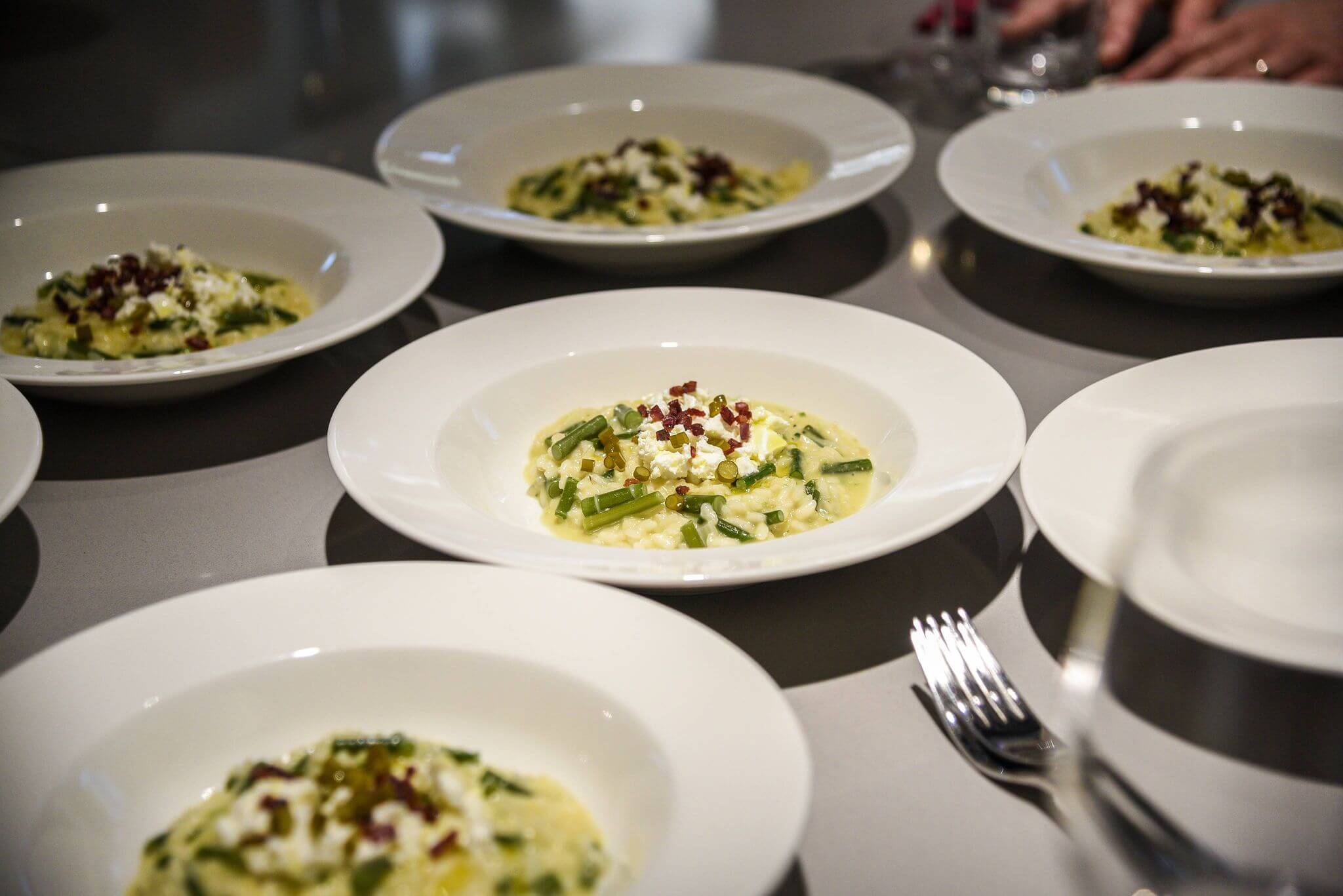
Chef Vjeko's wild leek risotto | Photo credit: JRE Croatia
Hardships in gastronomic tourism in Croatia
As the participants enjoy the food, they shared about the current problems people in gastronomy face especially those living in the Dalmatian region. "There is a big problem in Croatia with the supply chain. There are small producers with good products but due to various economic problems, have difficulty supplying sufficiently, regularly, and efficiently because they can only sell as much as they can produce. This makes the life of the chefs, restaurateurs, and people in this industry difficult in Croatia," according to Irina. Apart from the problem in the availability and regularity of supply of good quality ingredients, there is also a problem with manpower in this industry. "Although Croatia has excellent chefs and cooks, we are still new in the gastronomic scene and culinary schooling system compared to other European countries who have been a long-time destination for gourmands over the years. Because of this, JRE Croatia sincerely puts all their hopes to the young chefs of this country to help this industry succeed," she added. The seasonal character of gastronomy in the Dalmatian region and the geographical location of Croatia is also one of the reasons why the prices of food are slightly higher than others. Since Dalmatia is harder to reach especially its islands, to get a regular supply of ingredients itself is costly. "This is the aim of JRE - to have our professional chefs and restaurateurs conduct events such as this to get publicity and make the consumers understand why chefs cannot prepare risotto in 5 minutes, and why the prices of the dishes are the way they are. They have to know how hard and costly it is to get a quality and regular supply of ingredients in Croatia", Irina said.
One of the participants said that there is one restaurant in Zagreb that serves different menus every day using ingredients that are currently available. Chef Vjeko retorted, "You can do that in Zagreb because they have a full busy season throughout the year so the supplies are always coming unlike in Dalmatia, where the season lasts for only 3 to 4 months." He then added, "You will see that when you start working in restaurants here, you, too, will experience the difficulty in getting food supply which usually starts to happen from the end of May onwards". They also agreed that climate change greatly affects the production time, amount, and quality of produce. "In JRE, we also embrace sustainability. It requires knowledge to understand and respect nature and to know that we cannot have everything at great amounts whenever we wish. It is important to appreciate what we have when we have it", Irina voiced out.
The Island of Murter, Konoba Boba, and Chef Vjeko Bašić
Also called the gate to the Kornati, Murter is an island national park and one of the pearls of the Adriatic Sea. It is a popular destination for people who love sailing and explore remote islands. Paklenica National Park is also nearby where one can enjoy sightseeing, hiking, and walking. Konoba Boba makes use of the richness of the Adriatic sea and serves an interesting selection of fresh seafood including roe, sea urchins, oysters, mortar, and salicornia. While maintaining their culture, Konoba Boba never fails to innovate and continuously elevates their dishes with new exciting elements! In addition to that, the restaurant offers 50 cozy interior dining seats and another 80 outdoor ones with a garden view filled with aromas of Mediterranean plants and trees including marjoram, basil, rosemary, immortelle, mint, fig, lemon, mulberry, olive and etc. which they incorporate in their dishes as well. Konoba Boba also has a wide array of wine selection carefully handpicked by the restaurant's sommelier, Mateo Juričev Talijaš
Apart from the restaurant Vjeko is successfully running, he also has been pursuing his passion for olive oil production. "We have our olive garden with 2,000-year-old olive trees. In autumn and wintertime, we take care of the trees, harvest the olive, and produce our olive oil. This year, our olive oil received a silver medal and our family was very happy about it.", he proudly said to the participants. In his spare time, he also loves to fish. "When I was a kid, I used to fish a lot with my father. But now that I started this business, I do not have much time for it. I would love to do it once more once I decide to retire from this industry.", he added.
According to his wife, Chef Vjeko, who also serves as the Vice-President of JRE Croatia, is living his dream. With an award from the Gault&Millau Croatia 2018 Chef of the Year, a successful business on an island he deeply cherishes, and endless support from his loving families, peers, and community - we can all agree that he truly is living the dream.
For more information on Jeunes Restaurateurs' affiliated restaurants and hotels, CLICK HERE.
For more on lifestyle in Croatia, follow TCN's dedicated page.
For more about Croatia, CLICK HERE.
HTZ Bringing Famous Michelin-Starred Chefs to Varaždin
The Croatian National Tourist Board (HTZ), in cooperation with the Croatian Chamber of Crafts and the Croatian Chamber of Commerce, will organise the Croatia 365 Gourmet educational workshop which will be held on November 20 at the Hotel Turist in Varaždin. The workshop will present the latest trends in the food and wine segment as well as in marketing. Some of the participants are Michelin-starred chefs, reports Večernji List on November 19, 2018.
“I am very excited about the fact that Varaždin will be among the host towns of these workshops. Promotion of tourism in the continental part of Croatia is one of the main goals of the Croatian National Tourist Board, and this workshop is just one of many activities that we are carrying out in order to improve the quality in important segments such as food and wine tourism. This is also a great opportunity for all tourist workers and gourmets to get to know the tips and trick from some of the world’s top chefs,” said HTZ director Kristjan Staničić, adding that similar workshops had been successfully held in towns such as Zagreb, Opatija, Vukovar and others.
As part of the workshop, the participants will have an opportunity to attend a lecture on “Seafood, algae and their pairing”, held by chef Giuseppe Mancino, who holds two Michelin stars for the Il Picollo Principe restaurant in Viareggio. Mancini's lecture will include show cooking based on seafood and algae. “My cuisine is a blend of creativity and the classical approach. We try to rework typical dishes without changing traditional flavours,” Mancino said.
The lecture on “La Capinera as a treasure of the Sicilian cuisine rebuilt with intelligent and innovative creativity” will be given by chef Pietro D'Agostino, the holder of one Michelin star from the La Capinera restaurant in Taormina. His lecture will include a theoretical part about restaurant operations, as well as a practical part.
A lecture on “The impressive dessert for beautiful memories” will be given by Bruno Pastorelli, the pastry chef at Assiette Champenoise in Reims. His lecture will also include the preparation of some of his signature recipes. Chef Bruno is a real pastry genius and is the founder of the famous ELDA pastry school in Spain.
Maurizio Dante Filippi will present the lecture “Sommellerie: a passage through the senses for the pleasure of guests”, which will focus on the effective communication of wine history, as well as on the ways how to present the tastes of Croatian wines to guests who are unfamiliar with the wine varieties and regions of Croatia.
The programme will include a lecture on marketing by Gabriel Vasquez. Vasquez will discuss the possibilities for branding a specific area or destination through food. “Local and regional food provide additional value to the destination and thus contribute to the competitiveness of the geographic area,” said Vasquez.
The same workshop is taking place today at the Kompas hotel in Dubrovnik. It has brought together more than 80 participants.
For more on Croatia’s cuisine, click here.
“Culinary Germany” Presented in Zagreb
A tasteful event at the German ambassador’s residence.
Not Your Average Gourmet Class: Salting Sardines in Fažana
More than 2.000 people have been taught the traditional skill in the last 15 years the manifestation has been taking place in Fažana
Flavours of the Adriatic: Rab Cake
Continuing with our series dedicated to delicious dishes the Adriatic coast is known for, a look to a unique dessert on April 11, 2018
Boškinac Winery & Restaurant, A Quintessential Pag Island Experience
Continuing our coverage of the recent Gastronaut tour of Pag island, a look to a glorious gastronomic destination on April 6, 2018


